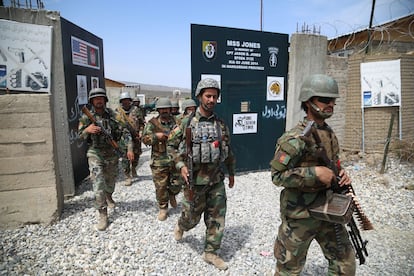US President Joe Biden lays a wreath at Arlington National Cemetery to honor veterans killed in the Afghan conflict on Wednesday. BRENDAN SMIALOWSKI / AFP
Joe Biden will not go down in history as the president who won the longest war in the history of the United States, but as the one who ended it 20 years later, convinced that there was no other way out of it than by simply getting out.
The president announced this Wednesday the unconditional and complete withdrawal of the troops from Afghanistan in a bitter speech, in which he assumed that continuing there did not allow "different results" to be envisioned.
"It is time for the American troops to go home," he said.
The decision shows the geopolitical turn of Biden, which prioritizes the internal challenges of the country and the external threats directly linked to them, which today are more embodied in China than in Afghanistan and the Middle East.
The George W. Bush administration launched the offensive on Afghanistan in response to the traumatic attacks of September 11, 2001 on the Twin Towers and the Pentagon, an attack perpetrated by Al Qaeda, a terrorist group sheltered by the Taliban.
By the next 9/11, 20 years later, the United States hopes to have completed the exit from the country, in a coordinated withdrawal with NATO allies.
The Taliban have not been defeated or al Qaeda liquidated forever.
What has happened has been, basically, time.
"We cannot continue with the cycle of extending or expanding our military presence in Afghanistan in the hope of creating the ideal conditions for our withdrawal, expecting different results," Biden said this Wednesday from the Treaty Hall, the same space from the that Bush announced in his day the beginning of the war.
Both Democrat Barack Obama and Republican Donald Trump tried to leave the country, but the instability of the territory held them back.
“I am the fourth president of the United States to have troops in Afghanistan.
There have been two Republicans and two Democrats, I will not pass this responsibility on to a fifth, "said the current president, and justified:" It is time to end the longest war, it is time for US troops to return to home".
The withdrawal will begin on May 1 and will be completed before the symbolic 20th anniversary of the attacks.
According to official data, the number of outstanding US military personnel rises to 2,400, although some estimates put it above 3,000, plus 7,000 for the coalition.
The Democratic president has promised to continue supporting the Afghan Government and to maintain the humanitarian mission, but the departure of the military mission will cease unconditionally, which has aroused criticism for the fragile situation in which the Afghan Government remains and demonstrates the internal priorities of the new Administration.
Afghan soldiers take over a former US-controlled military base in Nangarhar province this Wednesday. GHULAMULLAH HABIBI / EFE
“We went to Afghanistan for a horrible attack that occurred 20 years ago, that cannot explain why we should remain here in 2021. Rather than going back to war with the Taliban, we have to focus on the challenges that will determine our position and power over the years. to come ”, he argued.
Biden has embarked on an ambitious agenda of economic and social reforms that historians compare to Roosevelt's New Deal and Lyndon B. Johnson's Great Society and that require tons of resources and political effort.
As Trump believed, he believes that the center of gravity of foreign policy should prioritize the dangers posed by China, from the space race, to the commercial race, through the basic semiconductor supply network.
It is a shift in priorities towards the internal agenda.
Biden will not go down in history as the leader who resolved the conflict, because many of the objectives of that invasion have been breached, but as the one who released what for many is a drag.
Trump had agreed to it for this May, Biden only postponed it for a few months.
"Some insist that it is not the time to leave," said the Democrat, but "when is a good time to leave?
-has wondered- in another year?
In two more?
In another 10 years?
After 10,000, 20,000.
30,000 million dollars more?
Minutes later, Obama sent a communication supporting his decision.
Yesterday, Biden spoke with him and also with Bush about the matter.
Washington looks at China.
On the same Wednesday that Biden addressed the Americans, and the world, to explain the decision on Afghanistan, the director of the FBI, Christopher Wray, appeared in the Senate and explained that the agency was forced to open an investigation into China "every 10 hours".
“And I can assure you that it is not because we do not know what to do with our time.
We have some 2,000 ongoing investigations linked to the Chinese government, ”said Wray.
"I do not believe," he added, "that there is any country that represents a more serious threat to our innovation, our economic security and our democratic ideas."
The determination to prioritize efforts on other fronts is combined with an evident fatigue of the American people towards entrenched conflicts in countries that sound remote to the average citizen and that have claimed thousands of soldiers' lives and billions of dollars of their budget.
In Afghanistan, 2,400 of its military have died and around a trillion (about 850,000 million euros) have been invested.
In Pennsylvania, Wisconsin or Michigan what happens to their factories matters more than what happens in Kabul 20 years after the attack that incited that war and 10 years after the Al Qaeda leader who planned the attacks, Osama Bin Laden, was liquidated. .
It's a sentiment that Republican Donald Trump captured and endorsed and that his Democratic successor embraces as well.
Biden does not say that the Taliban have been defeated, that the Afghan people are safe or that the terrorist threat has been liquidated (although intelligence services estimate low risks on US soil).
What it says is that it is time to end the longest war in American history and for "the troops to go home."
The success or failure of this decision can be assessed over time internally.
If there is no new attack originating in that country, Biden will be applauded;
if something happens reminiscent of the nightmare of 9/11, the mistake will stain the memory of his entire tenure.
USA vs China: scenarios of the new cold war
Afghans fear another civil war after US troop withdrawal
From a global and human rights point of view, opponents of this measure need not wait.
The US intelligence services themselves have already warned that the Taliban will take advantage to expand their power and put the Afghan government in trouble.
The Washington Post,
for example, spoke harshly on Wednesday in the editorial dedicated to the matter.
Titled 'Biden takes the easy way out of Afghanistan.
The likely result is a disaster ', the newspaper criticizes the "abandonment" of the Afghan people who believed in the construction of a democracy and warns that it may simply lead to a restoration of the
status quo
of 2001 that could end up forcing the return of the soldiers.
Biden, who promised to put human rights at the center of his foreign action plan, has promised to continue humanitarian work and support for the country's government, but the decision to withdraw troops is evidence not only of Washington's new priorities, but also the new way of being in the world that the first world power has been defending for years.
He has insisted, yes, that the United States will not lose sight of the terrorist threat under any circumstances.
After the speech, he headed to Arlington Cemetery to pay his respects to those who fell in that 20-year war.









